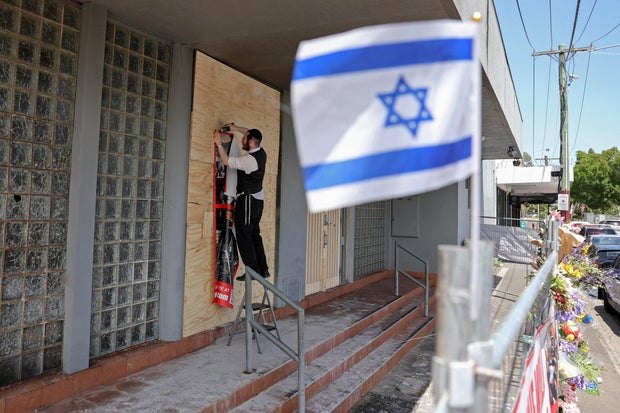Melbourne — Australian police said Monday they were seeking three suspects in an arson attack at a Melbourne synagogue, calling it an act of terrorism. Assailants wearing masks set fire to the Adass Israel Synagogue before dawn Friday, police said, destroying much of the building. Some worshipers were inside the single-story building at the time, but no serious injuries were reported.
The fire sparked international condemnation, including from Israeli Prime Minister Benjamin Netanyahu.
Police have “three suspects in this case, who we are pursuing,” Victoria Police Chief Commissioner Shane Patton told a news conference.
Investigations over the weekend made “significant progress,” Patton said, declining to provide further details about the operation.
MARTIN GARDER/AFP/Getty
Federal and state police officials, as well as Australian intelligence services, met on Monday and concluded the fire was “probably a terrorist incident”, the police chief said.
“Based on that, I am convinced that we have now suffered an attack, a terrorist attack on this synagogue,” Patton said.
Australia’s response to anti-Semitism ‘on the rise’
Anti-terrorist police joined the investigation. Under Australian law, a terrorist act is an act that causes death, injury or serious property damage to advance a political, religious or ideological cause and is intended to intimidate the public or a government.
The formal designation unlocks help from other federal agencies for the investigation, said Michael Zekulin, a terrorism researcher at the Australian National University.
“Basically, you get additional resources that you might not have gotten otherwise,” he told AFP.
There was no information to suggest further attacks were likely and Australia’s terrorism threat assessment remains at the “likely” level, said Mike Burgess, director general of the Australian Security and Intelligence Organisation.
Australian Prime Minister Anthony Albanese, who denounced the synagogue attack as a “scandal”, announced the creation of a federal police task force targeting anti-Semitism.
“Anti-Semitism is a major threat and anti-Semitism is on the rise,” Albanese said at a news conference, citing the synagogue fire and recent vandalism.
The task force will consist of federal police officers who will be deployed across the country as needed, officials said. They will focus on threats, violence and hatred towards the Jewish community and parliamentarians.
The war in Gaza has sparked protests by supporters of Israel and the Palestinian people in cities across Australia, like in much of the world.
In January, Australian lawmakers inaugurated a series of new laws in an effort to combat the rise in anti-Semitic acts, including banning the Nazi salute in public and the display or sale of Nazi hate symbols such as the swastika. The new laws also made it a criminal offense to glorify or praise acts of terrorism.
Australian Attorney General Mark Dreyfus said at the time that the laws send “a clear message that there is no place in Australia for acts and symbols that glorify the horrors of the Holocaust and terrorist acts”.
Israeli, Australian leaders ‘respectfully disagree’ on definition of anti-Semitism
Netanyahu attacked the Australian government’s position before the fire.
“This heinous act cannot be separated from the anti-Israel sentiment emanating from the Australian Labor government,” he said after the attack, declaring that “anti-Israel sentiment is anti-Semitism.”
Australia last week voted in favor of a United Nations General Assembly resolution that demanded an end to Israel’s “illegal presence in the Occupied Palestinian Territory.”
New Zealand, Britain and Canada were among 157 countries that voted for the resolution, with eight against, including the United States.
Australian Attorney General Mark Dreyfus rejected Netanyahu’s accusation.
“He is absolutely wrong. I respectfully disagree with Mr. Netanyahu,” Dreyfus told national broadcaster ABC on Monday. “Australia remains a close friend of Israel, as we have been since the Labor Government recognized the State of Israel when it was established by the United Nations. Now this remains the case.
